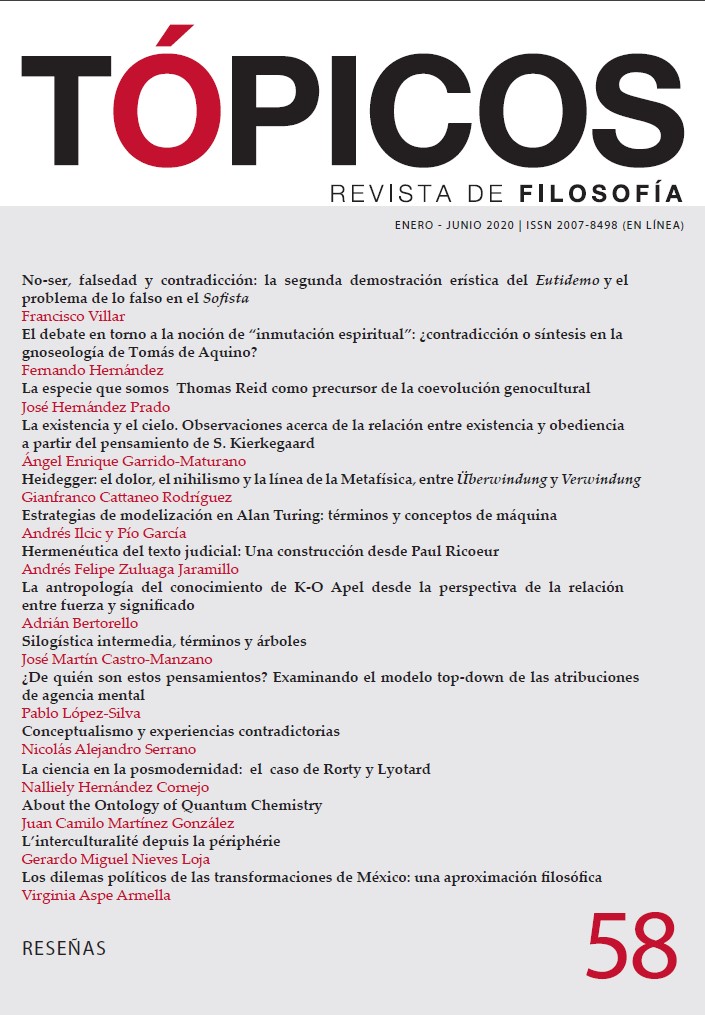Not-being, Falsehood and Contradiction: the Second Eristic Demonstration of the Euthydemus and the Problem of the False in the Sophist
Published 2019-12-13
Keywords
How to Cite
Downloads
Altmetrics
Citas
Abstract
This work proposes an interpretation of Euthydemus 283c-288b taking into account the problem of the false in the Sophist. My hypothesis will be that the second eristic demonstration of the Euthydemus can be understood as a representation of Sophist 236d-239b: while in this passage there it is the Stranger is the one who states what the sophist would say to defend himself from the seventh definition, in which he is accused of producing falsehoods, in the Euthydemus two sophists are who use the notions of non-being and falsehood to refute such accusation. The work has three parts. Firstly, I shall analyze Sophist 236d-239b and contextualize it within the framework of the seventh definition. Secondly, I focus on the characterization of Euthydemus and Dionysodorus as sophists. Finally, I analyze the three arguments that organize the second demonstration of the Euthydemus, trying to understand its structure and its role in the drama of the dialogue.
References
- Bossi, B. (2013). Back to the Point: Plato and Parmenides – Genuine Parricide? En B. Bossi y T. Robinson (eds.), Plato’s Sophist revisited.(pp. 157-173). Berlín: De Gruyter.
- Burnet, J. (1995). Platonis Opera I. Oxford: Oxford University Press.
- Canto, M. (1989). Platon. Euthydème. París: Flammarion.
- Chance, T. (1992), Plato’s Euthydemus: Analysis of What Is and Is Not Philosophy. Berkeley-Los Angeles: University of California Press.
- Chantraine, P. (1968). Dictionnaire Étymologique de la langue grecque. Histoire des mots. París: Klincksieck.
- Classen, C. J. (1979). Aristotle’s Picture of the Sophists. En G. B. Kerferd (ed.), The Sophists and Their Legacy. (pp. 7-24). Wiesbaden: Franz Steiner Verlag Gmbh.
- Corey, D. (2015). The Sophists in Plato’s Dialogues. Albany: State University of New York Press.
- Cordero, N. (1988). Platón. Sofista. Madrid: Gredos.
- Cordero, N. (2005). Siendo, se es. La tesis de Parménides. Buenos Aires: Biblos.
- Cornford, F. M. (1935). Plato’s Theory of Knowledge. Londres: Routledge y Kegan Paul.
- Crombie, I. M. (1963). An Examination of Plato’s Doctrines. Vol. II. Londres: Routledge y Kegan Paul.
- De Vries, G. J. (1982). Notes on Some Passages in the Euthydemus. Mnemosyne, 25, 42-55.
- Denyer, N. (1991). Language, Thought and Falsehood in Ancient Greek Philosophy. Londres-Nueva York: Routledge.
- Dorion, L. A. (2000). Euthydème et Dionysodore sont-ils des Mégariques? En T. Robinson y L. Brisson (eds.), Plato. Euthydemus, Lysis, Charmides. Proceedings of the V Symposium Platonicum. (pp. 35-50). Sankt Augustin: Academia Verlag.
- Gardella, M. (2013). Conflictos socráticos en el Eutidemo: la crítica platónica a la dialéctica megárica. Argos. Revista de la Asociación Argentina de Estudios Clásicos, 36, 45-64.
- Grote, G. (1850). History of Greece. Volume 8. Cambridge: Cambridge University Press.
- Guthrie, W. K. C. (1969). Historia de la filosofía griega III. Siglo V. Ilustración. Madrid: Gredos.
- Hawtrey, R. (1981). Commentary on Plato’s Euthydemus. Filadelfia: American Philosophical Society.
- Hitchcock, D. (2000). The Origin of Professional Eristic. En T. Robinson y L. Brisson (eds.), Plato. Euthydemus, Lysis, Charmides. Proceedings of the V Symposium Platonicum. (pp. 59-67). Sankt Augustin: Academia Verlag.
- Kahn, C. (2003). The Verb 'Be' in Ancient Greek. Cambridge: Hackett.
- Kent Sprague, R. (1962). Plato’s Use of Fallacy. Nueva York: Barnes & Noble.
- Kent Sprague, R. (1972). The Older Sophists. Indianapolis: Hackett Publishing Company.
- Kerferd, G. B. (1981). The Sophistic Movement. Cambridge: Cambridge University Press.
- Lidell, H. G., Scott, R. y Jones, H. S. (1996). A Greek-English Lexicon. Oxford: Clarendon Press.
- Marcos, G. E. (1995). Platón ante el problema del error. Buenos Aires: Fundec.
- Marcos, G. E. (2000). Las falacias en torno a la falsedad. Una lectura de Eutidemo 283e-286b a la luz de la solución del Sofista. En T. Robinson y L. Brisson (eds.), Plato. Euthydemus, Lysis, Charmides. Proceedings of the V Symposium Platonicum. (pp. 144-153). Sankt Augustin: Academia Verlag.
- Mársico, C. e Inverso, H. (2012). Platón. Eutidemo. Buenos Aires: Losada.
- Méridier, L. (1931). Platon: Ion, Ménexène, Euthydème. París: Les Belles Lettres.
- Narcy, M. (1984). Le philosophe et son doublé. Un commentaire de l’Euthydème de Platon. París: Vrin.
- Narcy, M. (2013). Remarks on the First Five Definitions of the Sophist (Soph. 221c - 235a). En B. Bossi y T. Robinson (eds.), Plato’s Sophist revisited. (pp. 57-70). Berlín: De Gruyter.
- Nehamas, A. (1989). Eristic, Antilogic, Sophistic, Dialectic: Plato’s Demarcation of Philosophy from Sophistry. History of Philosophy Quarterly, 7(1), 3-16.
- Notomi, N. (1999). The Unity of Plato’s Sophist. Cambridge: Cambridge University Press.
- O'Brien, B. (2013). Does Plato refute Parmenides? En B. Bossi y T. Robinson (eds.), Plato’s Sophist revisited. (pp. 117-155). Berlín: De Gruyter.
- Rickless, S. (2010). Plato’s Definition(s) of Sophistry. Ancient Philosophy, 30(2), 289-298.
- Sayre, K. (2006). Metaphysics and Method in Plato’s Statesman. Nueva York: Cambridge University Press.
- Sermamoglou-Soulmadi, G. (2014). Playful Philosophy and Serious Sophistry. Berlín-Boston: De Gruyter.
- Sonna, V. (2017). Ouk éstin antilégein: Antístenes tras las máscara de Parménides en el Sofista de Platón. Eidos, 27, 15-38.
- Villar, F. (2016). Los megáricos como sofistas erísticos. La respuesta platónica al ataque de Isócrates contra los socráticos. Eidos, 25, 185-213.






